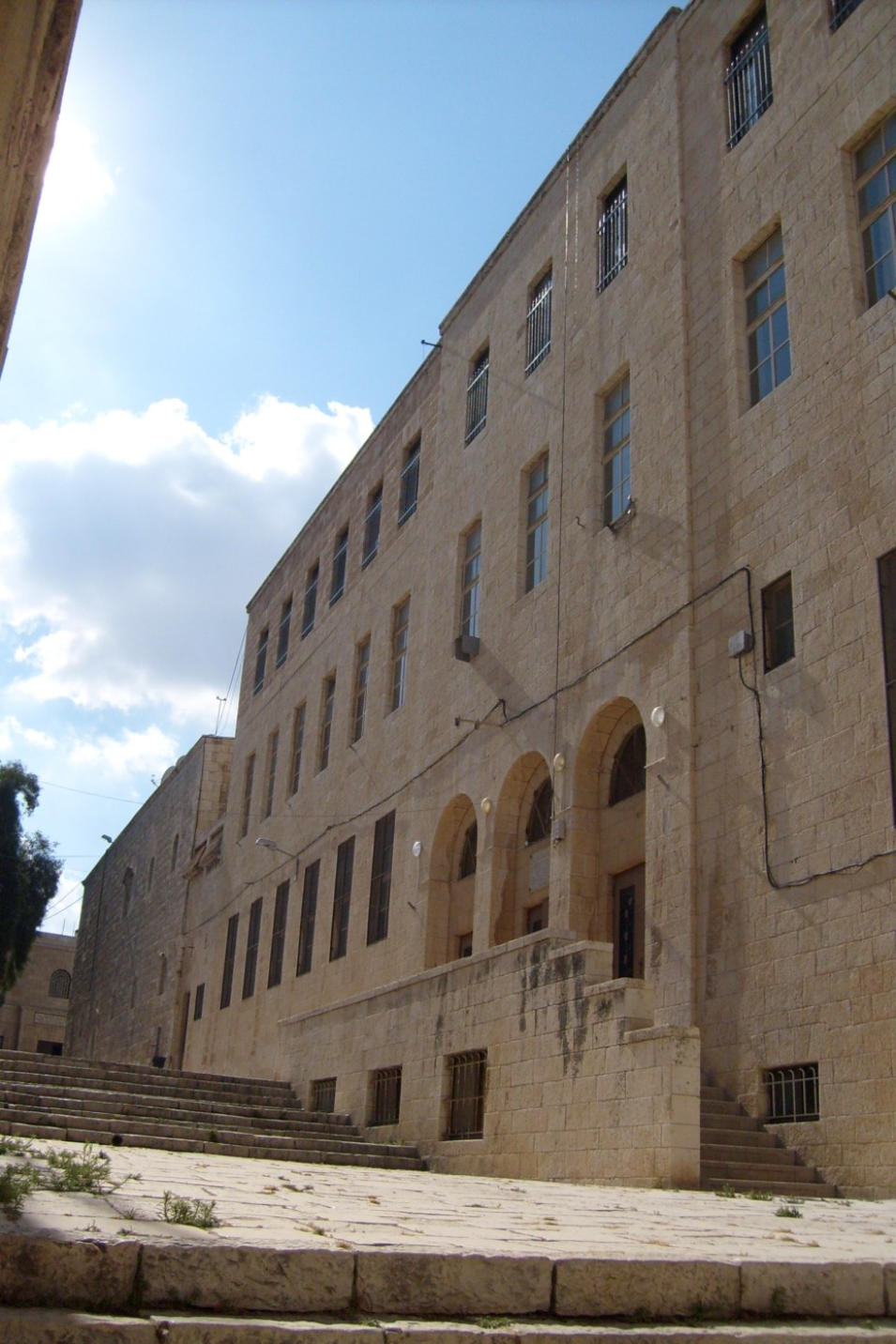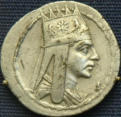

Armenian Jerusalem


For the Armenians of Jerusalem, descendants of a race
of mountainous warriors, but imbued as they have
become with the Middle Eastern ethic of sentimentality,
a child is their literal treasure on earth.
No vestal "gouyces" could have been more ethereally graceful and exquisite than the bevy of white-garbed, tremulous graduates clustered around the creaking platform. No aspiring, "ishkhan" could have been more handsomely resplendent in his brocade finery, or more masculine and self-possessed than the young men who hovered protectively around them. There they stood, clutching their diplomas in one hand, their dreams in the other, with the huge cutout painting of Saint Mesrob towering over their heads, listening with rapt attention to the exhortations of their indefatigable principal and spiritual adviser, Bishop Gyuregh Kapikian, who had seen them developing, year by year, *from helpless crawling larvae into dazzlingly arrayed butterflies, waiting impatiently to try out their wings. Despite the traumatic, often violent discombobulations in the political arena of the region, Kapikian had been able to steer his charges, through a treacherous minefield, to this, their moment of greatest glory: Graduation Day, at the St. Tarkmanchatz. They still had to face another heavy barrage of examinations (the crucial London University General Certificate of Education, GCE), and although these are uncompromisingly demanding, the Tarkmanchatz hopefuls had been gearing up for them for quite a while. The maudlin tradition of the "Amaverchi Hantess" has survived for over half a century and has been an endless succession of bright stars tossed into the darkness of a befuddled world, illuminating it, even if briefly, with the fire that informs the Armenian soul. And as he has done for the duration of his lengthy tenure, Kapikian has consecrated the day;s festivities to the memory of some glorious episode culled from the pages of Armenian history. This year Graduation Day coincided with the the 70th anniversary of the battle of Sardarabad. Sardarabad . . The word, with its quadruple, resounding, throaty 'A's evokes such a multitude of passionate emotions in all Armenians - this was the original, crucial battle of Avarair, all over again, fought against a most bloodthirsty enemy whose sole aim was nothing less than the total annihilation of the proud Armenian race, descendants of the immortal Haig who had vanquished the tyrannical Pel. "When there is no way out at all, "And when all hope is lost, "Then may madmen find a way ... "This was how the day of the great battle of Sardarabad dawned" as Edgar Hovhannesian sang. Bands of desperate Armenians, led by their priests, scurrying from town to town, village to village, street to street, mobilizing every man, woman or child able to bear arms, for the battle that would decide the fate of their fatherland. "Armenians have always won their victories with their deaths," as Gevorg Emin says in his "Seven Songs About Armenia." Every Armenian, no matter what spot on earth he may call home, lodges in his soul the undying flame immortalizing the endless litany of martyrs and heroes that have illuminated the pages of the illustrious history of this nation. And the tiny community of Armenians in Jerusalem is no exception. In fact, despite the sometimes acrimoniously morbid spate of ill-feeling that factional politics have since time immemorial spawned among them, the hardy relics who continue to wage their inexorable battle for survival here, remain one of the most dynamic and tenacious of all the "bantukhds" of the diaspora. No matter how disparaging their shortcomings, or how scabrous their conduct, these incorrigible larrikins continue to keep the flame alight. Walking through the history-encrusted alleyways of the St. James compound, you breathe that rarefied air that has invigorated interminable generations of your forefathers, with its distinctive Armenian aroma: the black-scarved "barays" exchanging the latest round of gossip, the staple Sunday shish kebab party against the background of a mellifluous rhapsody by some "ashough" bewailing his lost love, the heady incense and soulful tunes of the Badarak wafting on the breeze, that seems to encapsulate the eternal wanderlust of the Armenian and, above all, wallowing in the invigorating luxury of an extravagant inundation of Armenian: hearing Armenian, thinking Armenian, speaking Armenian, in an oasis of self-assertion, standing out among the babble of alien tongues that makes Jerusalem so special. "No man who does not know the Armenian language can ever be a real Armenian, or share in the glories of his people, or be a part of its history," Archbishop Karekin Kazanjian, the Grand Sacristan, reminded the graduates as he bade them farewell and godspeed. He needn't have worried. The Tarkmanchatz, despite some quite glaring anachronisms, makes sure its students receive a thorough drilling in their mother tongue and an all-round indoctrination in the religion and history of their forefathers. And Graduation Day is nothing if not a grand triumphant testimony to that: for two hours, the captive audience sat enthralled (there was the usual quota of bored, restless souls yearning for release), listening to a rolling litary of orations, speeches, songs, poems, delivered in uplifting Armenian. Perhaps, the most haunting memory people took back with them was the Farewell Song, lyrics by Yeghivart (pen-name of Patriarch Yeghishe Derderian), music by Ohan Durian. In a haunting cadence, it mourns "the golden days of our childhood, the beautiful days that we lived at the Tarkmanchatz." There were few dry eyes when the nine ex-students together sang "Mnak Parov" for hardly anyone remained unmoved by the old familiar strains that he or she himself/herself had sung, only yesterday, it seemed. But long before it was over, each of the nine had spent wakeful nights pondering his/her prospects for the future. For whiz kid Elie Kahvejian, the world will be a silicon chip, while Sarkis Ishkhanian will shoulder a camera and follow in his father's footsteps. Sarkis Djernazian has his heart set on going to Armenia, but his parents are against the idea, and like Seven Panosian, he will most probably end up as a jeweler or goldsmith, Lili and her sister Dalila Chavoushian, will join the inexorable exodus to the States, but Azniv Baghdasarian, who ran away with an armful of distinctions, will join a local university. Seta Ajemian is keen to take up graphic arts, and Jacqueline Hagopian (with several distinctions to her credit), has the option of going back to Australia, where she was born, to Yerevan, on a full scholarship, or to a local art academy. And for Marta and Aster Getaneh, the two Ethiopian sisters who are also graduating this year, it is the Egyptian skyline which beckons.
























